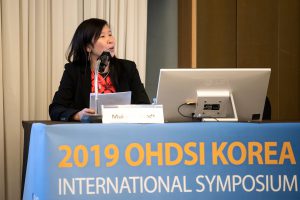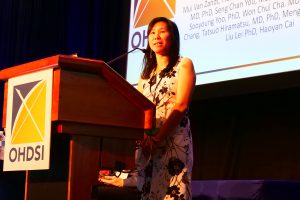Previous Spotlights: Clair Blacketer • Kristin Kostka • Anthony Sena • Kees van Bochove
Mui Van Zandt is a Director of Product Development at IQVIA, and she manages the OMOP Factory. Mui’s areas of expertise include software development, data conversions, agile process, and project management. Mui has gained extensive knowledge working on large patient databases in the OMOP model and the standard vocabularies that are needed to support these conversions.
Mui is an active contributor to the community through various OHDSI working groups. She is one of the co-leaders of the China OMOP CDM/Vocabulary working group. She leads two of the sub-working groups within the THEMIS working group. She has and continues to perform OMOP tutorial training to many different organizations and conferences, such as the OHDSI Symposiums, the China Hackathons, and individual universities.
A veteran of the OHDSI community, Mui recently shared some thoughts on her journey with the community, her work on the CDM and vocabularies, OHDSI progress, and more during the latest edition of the Collaborator Spotlight.
Can you discuss your primary roles within the OHDSI community as part of IQVIA?
My primary role is to help bring awareness of OHDSI/OMOP to the Asia-Pacific (APAC) community and bridge the gap between the Western and Eastern hemispheres. I’ve been working with the different Asia-Pacific countries, providing them with guidance and tutorials that will enable each country to expand its OMOP capabilities and skills. Over the last few years, there have been quite a few firsts that I am honored to be involved in. In 2018, Christian Reich and I taught the first in-person China tutorial in Shanghai which attracted over 70 people from both Korea and China. Last year, we taught our first OHDSI tutorial in Korea. OHDSI chapters in Australia, Japan and Singapore were formed last year. OHDSI Australia has its own website, while OHDSI Japan has its own forums. Since the 2020 US OHDSI Symposium is virtual, we are organizing an APAC version of these tutorials to be taught on the same day during the Asia-Pacific time zone. Finally, we are organizing the first APAC Symposium in December 2020 to highlight the efforts happening within each APAC country as well as the studies we are doing as a group.
You have taught several tutorials on OMOP and vocabularies. For those new to the community, can you explain how these impact network research so significantly?
The OMOP CDM/Vocabulary is the foundation of OHDSI, and thus fundamental to anyone who wants to understand OMOP and collaborate with our community. You may not have the data, but you must understand the principles of OMOP and the standard vocabulary in order to perform research. OHDSI has a lot of documentation out there, but nothing beats having someone there for you to ask questions when you don’t understand something. And our class is extremely entertaining. We want folks to walk out the door truly understanding the OMOP CDM and the vocabularies, thus is it not just a lecture. Come join us during the next US Symposium and you’ll find out how fun it can be. ?
You have been one of the leaders in OHDSI’s growth in Asia. While COVID may have limited some in-person plans in 2020, can you discuss some of the more exciting developments within the community in the Asia-Pacific Region?
COVID-19 has put a damper on things, but it has not stopped us from continuing the efforts in the Asia-Pacific region. In China, the community is translating The Book of OHDSI in Chinese and planning on publishing it soon. Soon to be released will be a localized version of Atlas which in Korean and Chinese. Dani Prieto-Alhambra was able to provide an in-person talk to the Japanese chapter before the pandemic started. The Australian chapter is having monthly talks showcasing OHDSI collaborations in Australia. Taking advantage of this virtual world, they are now inviting global guests to speak during their monthly meetings. As a group, the team is working on a study regarding hypertension which will be showcased during the APAC Symposium. We are going to be offering the first Asia-Pacific series of OHDSI tutorials during the OHDSI US Symposium. Many of them will be in multiple languages! Of course, we cannot forget about the first APAC Symposium. We were looking forward to this being in person. Like all other conferences during the pandemic, it will be virtual, but this does not stop us from making it a big splash.

One of the driving forces of OHDSI’s growth in Asia, Mui Van Zandt moderated the panel on “Sharing the International Experience from Asian-Pacific Region” at the 2019 OHDSI Korea Symposium.
Registration is open now for the 2020 APAC Symposium in December. While you are still in the planning stage, do you have a sense of the growing excitement for newcomers in Asia, and what can they expect if they attend the symposium?
We are very excited to announce the first APAC Symposium scheduled for December 5-6 during Asia-Pacific time. It is going to be 2 half days so that folks from the US and EU can attend if they want – virtual meetings at its best! This is a great opportunity for folks to participate in such a historical moment. We will kick it off Day 1 with Patrick Ryan, George Hripcsak, and Christian providing us with the opening session. After that, we will have global experts showcase how the community has come together to do research that has impacted all of us globally. Then, the Asia-Pacific research team will talk through the research they are doing. We will round up Day 1 with another global network study. Day 2 will start off with a highlight from all the different Asia-Pacific regions. Then folks can choose to attend the different regional chapter activities. We will end the day with a closing ceremony that will showcase what our visions are in 2021. Oh, we cannot forget the Collaboration Showcase. We need to make sure we showcase all the work that the Asia-Pacific teams are doing.
You are one of the original Titan Award recipients, earning an honor for community collaboration. How important is the idea of ‘collaboration’ for an open-science community to make a true impact, and how special was that honor to you?
It was a great honor to receive the Titan Award for community collaboration. Receiving the reward helps confirm my belief that open collaboration is the best way of solving problems. Community collaboration is extremely important. It’s the key to better research. There are many people who want to help and make a difference, but at times, just don’t know where to start. OHDSI is great at providing such a platform where people can openly join, learn, and contribute in ways they are comfortable. There is a lot of knowledge out there and sharing it will help us, as a whole, improve our overall health. COVID-19 is the perfect example. There is so much we do not know about this pandemic. Being able to share the knowledge, collaborative perform research as one community will help the different organizations more quickly understand this disease and push our way out of “lockdowns.”
You have been one of the community leaders from the earliest days of OHDSI. What inspires you most about the community that has made you such an active collaborator and leader?
What inspires me the most to stay active and a leader is the ability to collaborate to improve our overall health decisions and better care. It’s something I truly believe in as a great cause for ourselves and our future generations. There are so many out there who think just like me and it really shows by the amount of openness and collaboration that is out there in the OHDSI community. Both personally and professionally, it’s great to see the number of people who care and want to help, and then actually do help and make a difference. There’s always someone else out there who knows the answer and is willing to help. I personally have learned a lot from the community, thus I want to be able to give that knowledge back to those who haven’t had the opportunity to learn what I’ve learned. I love teaching tutorials. It allows me to help those who are new and want to be part of this community. I’m always inspired to find new ways of reaching out to more people so that they can also join our community.
What are some of your hobbies, and what is one interesting thing that most community members might not know about you?
I love to watch K-drama and C-drama. This is my way of unwinding from a long day at work. Sometimes, when I get into a drama series, I can spend the whole day watching the entire series and never leave the bed. I also like family gatherings. I come from a large family so it’s very common for us to get together. And as my parents would say, the more the merrier, however, I always feel bad for the one who has to do the cooking. It’s a lot of food to make for 28 people! What most people don’t know about me? I grew up on a farm that sits in the middle of California’s capital city. And after so many years, it’s still there. We are very fortunate to get much of our food fresh either from the farm or the rivers around us. You name it – a variety of Chinese vegetables, Chinese squashes, Chinese herbs, tomatoes, zucchinis, watermelons, cantaloupes, cucumber, chicken, fish, lettuce, lemon, plums, peaches. Ok, now it sounds like I’m bragging. He he he ?

